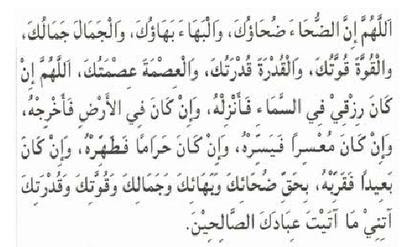Sometimes Allah puts you through pain, so He can test you to see if this
brings you closer to Him. If it brings you closer to Him then your
reward in Heaven is going to make all the pain you had to endure in this
world seem very insignificant. Keeping striving and don't let the small
distractions of this world lead you astray!
Allah sends the best things when you are ready for them. Remain patient
and be steadfast in the path of Allah, for surely Allah never fails to
accomplish his purpose. You are part of greater plan that you do not
have the vision and the knowledge to understand. You can only surrender
yourself to Him, thank Him, and let Him bless your life with treasures
you never could have attained on your own. His plan is the ultimate
plan, and His plan is the best plan. When the time is right, His plan
will manifest into your life, and all the wait will have been well worth
it!
“Oh Allah, verily the time of Dhuha is but Your time of Dhuha, all
beauty is but Your beauty, all strength is but Your strength, all power
is but Your power and all protection is but Your protection.”
”Oh Allah, if my rezqi is still in the the skies, please let if down and if it’s still in the ground, please let it out. Please make it easier if it is hard, if it is haraam please make it halal and please make it nearer if it is still far away. The blessings of the time of Dhuha, Your greatness, Your beauty, Your strength and Your power; bestow upon us all that you have bestowed unto Your righteous servants.”
”Oh Allah, if my rezqi is still in the the skies, please let if down and if it’s still in the ground, please let it out. Please make it easier if it is hard, if it is haraam please make it halal and please make it nearer if it is still far away. The blessings of the time of Dhuha, Your greatness, Your beauty, Your strength and Your power; bestow upon us all that you have bestowed unto Your righteous servants.”
The morning prayer
It is
also known by the names 1) Sibhat al-Duha (Sibha meaning supererogatory;
Duha meaning morning), 2) Salat al-Awwabin (meaning Prayer of the
oft-returning – this term is also related to the word “tawba” which
means ‘to repent’); this prayer is usually referred to as Salat al-Awwabin
when it is prayed in mid-morning about one or two hours prior to Dhuhr,
3) Salat al-Ishraq (meaning Sunrise prayer – think of shurooq as
sunrise), and 4) Salat al-Fath (meaning the Victory Prayer because the
Prophet Muhammad (SAWS) prayed this upon entering Makkah and so this has
become the sunnah of military leaders when entering a newly conquered
region.)
Abu Dharr (May Allah be pleased with
him)reported: The Prophet (PBUH) said, "In the morning, charity is due
on every joint bone of the body of everyone of you. Every utterance of
Allah's Glorification (i.e., saying Subhan Allah) is an act of charity,
and every utterance of His Praise (i.e., saying Al-hamdu lillah) is an
act of charity and every utterance of declaration of His Greatness
(i.e., saying La ilaha illAllah) is an act of charity; and enjoining
M`aruf (good) is an act of charity, and forbidding Munkar (evil) is an
act of charity, and two Rak`ah Duha prayers which one performs in the
forenoon is equal to all this (in reward).''[Muslim].
Salat
al-Duha is a Sunnah Mu’akkada which means that it is an emphasized or
recommended sunnah. Abu Hurayra (by Ahmed in his musnad) narrated “My
beloved instructed me never to leave three things until I die: fasting
three days a month, praying Salat al-Witr before sleep, and praying 2
rak’ats of Salat al-Duha, which is Salat al-Awwabin.” The preferred time
for it begins after one-quarter of the day has passed. On the day of
`Eid, it is preferable to pray al-Duha before Salat al-`Eid.
Zaid bin Arqam (May Allah be pleased with him) reported: "The Salat of the penitent is to be
observed when the young ones of camels feel the heat of the sun (i.e.,
when it becomes very hot).''[Muslim].










